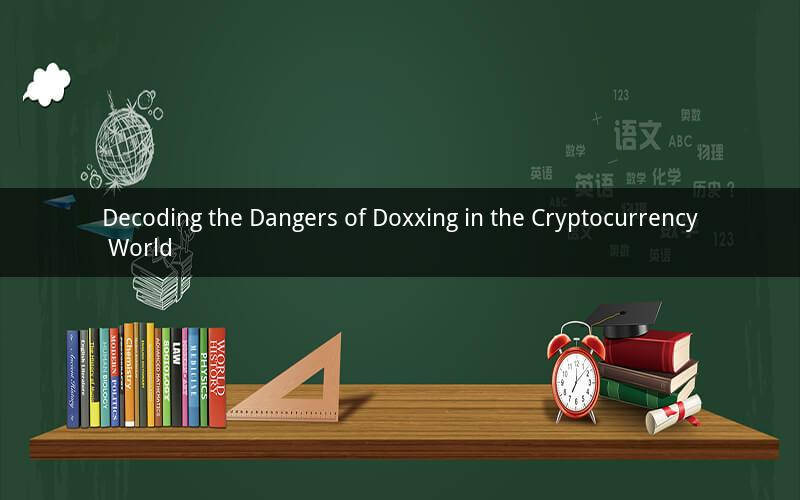
Introduction:
In the fast-growing world of cryptocurrencies, privacy and security are paramount. However, the dark side of this digital realm is the presence of malicious actors who exploit vulnerabilities for their gain. One such malicious activity is doxxing, which has been a topic of concern for many in the crypto community. This article aims to delve into what doxxing in crypto is, its implications, and how it affects the cryptocurrency ecosystem.
What is Doxxing in Crypto?
Doxxing, derived from the term "dox," which stands for documents or documentation, is the act of revealing a person's personal information without their consent. In the context of cryptocurrencies, doxxing refers to the unauthorized disclosure of someone's real name, address, phone number, email, and other personal details to the public. This act is often carried out by individuals or groups with malicious intent, aiming to tarnish someone's reputation, cause harm, or even extort money.
Implications of Doxxing in Crypto
1. Privacy Breach:
Privacy is one of the core principles of cryptocurrencies. Users expect their financial transactions and personal information to remain confidential. However, doxxing undermines this trust by exposing their sensitive data to the public. This breach of privacy can lead to numerous consequences, including identity theft, financial loss, and harassment.
2. Reputation Damage:
The cryptocurrency world is built on trust and credibility. Doxxing can severely damage an individual's reputation, leading to loss of business opportunities, friendships, and social connections. It can also create a chilling effect, where individuals hesitate to engage in cryptocurrency activities due to the fear of being doxxed.
3. Financial Consequences:
Doxxing can have severe financial implications. Malicious actors can exploit the disclosed personal information to steal cryptocurrencies, empty bank accounts, or sell the information on the dark web. This not only affects the victim's financial stability but can also disrupt the overall crypto ecosystem.
4. Legal Repercussions:
In many jurisdictions, doxxing is considered a serious offense. It violates privacy laws and can lead to legal action against the perpetrators. Additionally, the victims may seek legal remedies to protect their personal information and seek damages for the harm caused.
How Doxxing Affects the Cryptocurrency Ecosystem
1. Undermines Trust:
The cryptocurrency ecosystem relies on trust among participants. Doxxing erodes this trust, making it challenging for individuals and businesses to engage in legitimate activities. This lack of trust can hinder the growth and adoption of cryptocurrencies.
2. Discourages Participation:
The fear of being doxxed can discourage individuals from participating in the cryptocurrency space. This reduces the pool of potential users, investors, and developers, ultimately impacting the growth and development of the ecosystem.
3. Increased Regulatory Scrutiny:
As doxxing becomes more prevalent, regulators may impose stricter measures to protect users' privacy. This can lead to increased regulatory scrutiny, potentially impacting the flexibility and innovation in the cryptocurrency space.
4. Encourages Cybersecurity Measures:
The rise of doxxing has prompted the development of stronger cybersecurity measures. This includes the use of advanced encryption techniques, secure wallets, and privacy-focused cryptocurrencies. However, the continuous evolution of doxxing techniques makes it challenging to keep up with the required security measures.
Frequently Asked Questions
Q1: Is doxxing illegal in all countries?
A1: No, the legality of doxxing varies across countries. While many countries have privacy laws that prohibit doxxing, others may not have specific regulations addressing this issue.
Q2: Can doxxing occur within a decentralized cryptocurrency platform?
A2: Yes, doxxing can occur within decentralized platforms. Since these platforms often lack centralized control, it can be challenging to prevent or mitigate doxxing incidents.
Q3: Are there any privacy-focused cryptocurrencies that can protect against doxxing?
A3: Yes, there are privacy-focused cryptocurrencies, such as Monero, Zcash, and Dash, that provide enhanced privacy features. These cryptocurrencies use advanced techniques to hide users' transactions and personal information.
Q4: Can victims of doxxing seek legal action against the perpetrators?
A4: Yes, victims of doxxing can seek legal action against the perpetrators. However, the effectiveness of legal action may vary depending on the jurisdiction and the severity of the offense.
Q5: What measures can individuals take to protect themselves against doxxing?
A5: Individuals can take several measures to protect themselves against doxxing, including using strong passwords, enabling two-factor authentication, keeping personal information private, and using privacy-focused cryptocurrencies.
Conclusion:
Doxxing in the cryptocurrency world is a significant threat to privacy, reputation, and financial security. As the crypto ecosystem continues to evolve, it is crucial to understand the implications of doxxing and take necessary precautions to protect oneself. By raising awareness and implementing robust security measures, we can create a safer and more secure crypto environment for all participants.